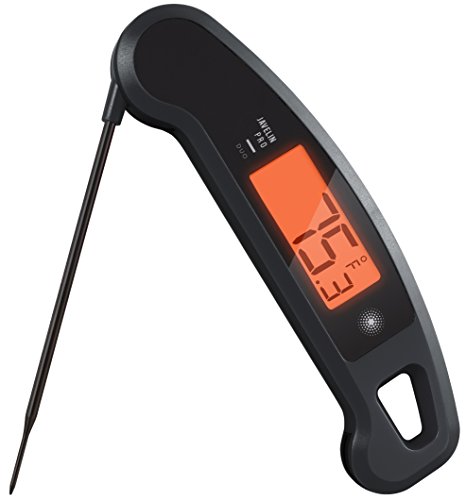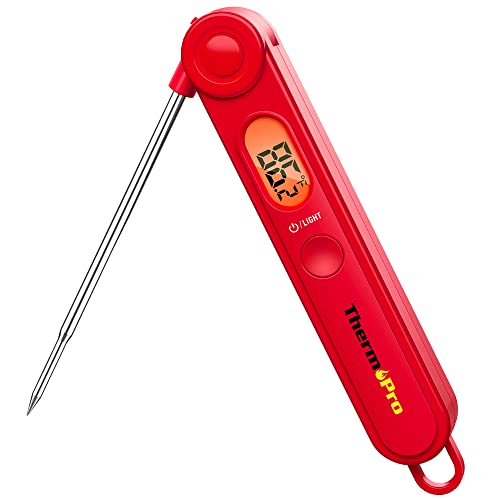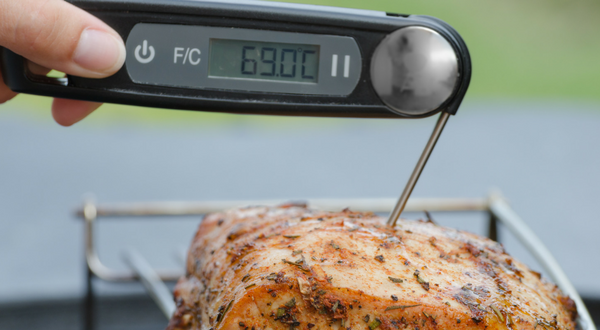Our Best Probe Thermometers
ThermoPro TP03A Digital Cooking Thermometer
ThermoPro TP-16 LCD Digital Cooking Thermometer
ThermoPro TP20 Wireless Remote Digital Cooking Thermometer
Instant Read Probe Thermometer
Habor Instant Read Probe Thermometer
Our No. 1 Probe Thermometer
Lavatools Javelin PRO Duo Probe Thermometer

What Is A Probe Thermometer?
When thinking of the classic cooking thermometer, you probably are picturing a probe thermometer. As the name suggests, this thermometer has a long stem, made of metal and can be fairly sharp at the end, that is inserted into food to help determine if the food has reached a temperature in which it is safe to eat. At the end of the probe is the temperature gauge, which can be digital or analog, in order to give you the information you need.
How Do Probe Thermometers Work?
The probe thermometer works by utilizing two different pieces of metal. One of these pieces of metal expands and contracts at a low temperature, while the other piece of metal requires a higher temperature to expand or contract. The movement of the metals prompts the dial to move, indicating the temperature of the food you are working with.
What Are The Uses and Which Professions May Need A Probe Thermometer?
As discussed above, probe thermometers are often used in cooking and baking. Therefore, probe thermometers can be used for many different reasons in your kitchen, from making sure your Thanksgiving Turkey has been cooked to the proper temperature to making sure that your cake is hot enough and properly set. Probe thermometers can also be used in deep frying and candy making, though some models may not be durable enough for this type of use, and there are other, more specific options for hot oil or confections.
Therefore, bakers and chefs, both amateur and professional, should have a probe thermometer in their toolbelt to ensure that they are cooking their wonderful food to proper – and safe – temperature.
Additionally, those who work in food safety and inspection will also have a probe thermometer in their arsenal as well, to ensure that restaurants and cafeterias are utilizing the proper food service and safety techniques.
Beyond cooking, probe thermometers also have places in non-food settings, such as laboratories working with liquid and semi-solid samples.
Types of Probe Thermometers
Probe thermometers come in a couple of different forms. You can choose from a thermometer with a digital face or a more traditional analog face.
Probe thermometers also come in wireless options. These thermometers utilize bluetooth technology to connect to a digital component that is kept away from the heat source. Additionally, some of the more high tech wireless options will actually sync up with your phone so you can keep track of your food while accomplishing other tasks and not disturbing the cooking process.
Other probe thermometers are not wireless, but instead have a very long wire attached to it so that only the probe is inside the oven, grill, or smoker, while the rest of it sits away from the heat source so as to not damage the digital part of the thermometer.
Accuracy of Probe Thermometers
The accuracy of your probe thermometer will depend on the brand you choose as well as the amount you are willing to spend on a thermometer. Some of the more expensive thermometers are able to quickly and accurately tell you the temperature of a substances, and can be accurate to one-tenth of a degree. Digital probe thermometers, just by design, will be more accurate than their analog counterparts.
Features to Look For In the Best Probe Thermometers
When on the lookout for a new probe thermometer for your kitchen, there are a couple of different aspects to look at. The first is speed of the thermometer. When you are cooking that perfect steak, time is of the essence, so it is important for a thermometer to work quickly. Ideally, a thermometer will give an accurate read out in between 3 to 10 seconds.
Next, it is important that your thermometer is accurate. As discussed above, a probe thermometer can vary wildly in accuracy depending on brand, type, and price, so it is important to read reviews and descriptions of a thermometer prior to purchase. Some thermometers may be more accurate depending on if you are measuring hot or cold, or depending on the type of food you are measuring.
Finally, it is also important to find a thermometer that is oven safe. This is especially important when cooking at a high temperature or for long periods of time when opening and closing the oven door repeatedly to check the temperature would be detrimental to the process of cooking, or would elongate the time it takes to cook.
Conclusion
There are plenty of different probe thermometers on the market today, and it is up to you if you want to spend a lot of money on a very fancy thermometer, or if you are just looking for a basic one to get the job done. There are plenty of fairly reasonably priced thermometers out there that will give you quick, accurate results so you can keep on cooking, worry free. We have gathered a list of the best probe thermometers, so you can easily find a thermometer to
Best Prode Thermometers
ThermoPro TP03A Digital Cooking Thermometer
Instant Read Meat Thermometer for Kitchen BBQ Grill Smoker

Pros
Cons
ThermoPro TP-16 LCD Digital Cooking Thermometer
Great Thermometer For Food, Meat, Smoker Ovens, BBQ, and the Grill. Thermometer plus Clock, Timer with Stainless Steel Temperature Probe

Pros
Cons
ThermoPro TP20 Wireless Remote Digital Cooking Thermometer
A great Meat Probe Thermometer with Dual Probe making it a mush for your Smoker Grill and BBQ

Pros
Cons
Instant Read Probe Thermometer
Simple to use and ultra fast making it great for all you Food, Smoker, Grilling and Cooking needs. Backlight and waterproof.

Pros
Cons
Lavatools PT12 Digital Instant Read Meat Probe Thermometer
Fast and Acurate Reading Great for all your Thermometer needs. Designed in California.

Pros
Cons
Lavatools Javelin PRO Duo Probe Thermometer – Digital Instant Read
Fast, Acurate, Compact


